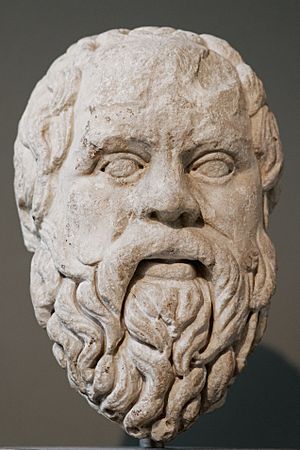Ethics facts for kids
Ethics is a part of philosophy that helps us understand what is good and what is evil. It's about figuring out how we should act and make choices.
Ethics tries to answer questions like:
- What actions are good or bad?
- How do we know the difference?
- Are good and evil always the same for everyone?
- How do we make tough choices that might affect other people?
- How do our actions impact others?
Contents
Different Ways to Think About Ethics
When people talk about ethics, they often look at it in a few ways:
- Thinking about what is right or wrong, which is called morality.
- Using a scientific approach to study human behavior.
- Considering how much freedom people have to make their own choices.
Morality is what someone believes or feels is good or bad. There are many different moral beliefs around the world. However, many moral ideas are shared by most people. For example, most people agree that killing someone is wrong.
Some thinkers hope to find more ideas that all moralities share. They believe that ethics should use the scientific method to study what people think is good or bad. This work can help us understand if a situation is fair. An example of this idea is the categorical imperative, which suggests we should act in ways that we would want everyone else to follow. Many countries have laws based on this idea of fairness.
Why Ethics Matters in Daily Life
Understanding ethics can help people decide what to do when they have choices. Many philosophers believe that every action or choice we make is connected to ethics.
Ethics is important in many different areas of life and study. Here are some examples:
Ethics and Religion
Ethics is a big part of religion. In many religions, people learn what is good or bad from their beliefs about God (or gods). Some very important ideas about right and wrong have come from religion. For example, the Ten Commandments offer rules for living a good life.
Ethics and Money
Some ideas in economics connect ethics with money. Money is a big part of most people's lives. Thinking about what is right or wrong can be very important in economics. For instance, there is a saying from the Bible that 'the love of money is the root of all kinds of evil'. The philosophy of Marxism also suggests that if a few people use money in the wrong way, it can harm many others.
Ethics and Government
What politicians think is ethical can affect government policy. Politicians try to create laws that help everyone do what is right. When people who make public policy disagree about what is right, it leads to political debates.
Ethics in the Workplace
In work, thinking about ethics can help with difficult questions. Work involves both money and following rules. But knowing the best way to do both is not always easy. The study of this is called business ethics. It helps businesses and workers make good choices.
Ethics in Healthcare
People like doctors and nurses have to make hard choices about how to care for people. Sometimes the person being cared for, their family, or the doctor do not agree on what is best. Also, choices must be made if there is not enough money for everyone to get the help they need. The study of this is called medical ethics.
Ethics and Peace
Talking about ethics can also be a way to stop people from fighting or starting a war. By discussing what is right, people hope to get what they want without being violent. This works best when everyone agrees that peace is very important. However, not everyone agrees about what is right or wrong. So, sometimes anger can make it hard to talk without fighting.
Along with aesthetics (the study of beauty), ethics forms part of axiology. Axiology is the philosophy of what people value or like.
Related Pages
- Conflict of interest
- Utilitarianism
- The Republic, a book by Plato that says people with power should use ethics to make choices.
- The Prince, a book by Niccolò Machiavelli that says people with power should not always use ethics to make choices.
Images for kids
See also
 In Spanish: Ética para niños
In Spanish: Ética para niños







